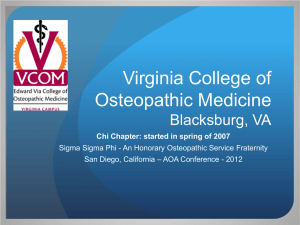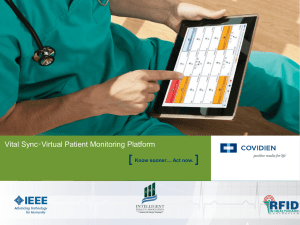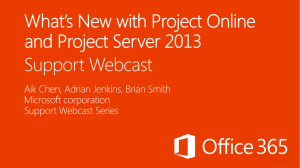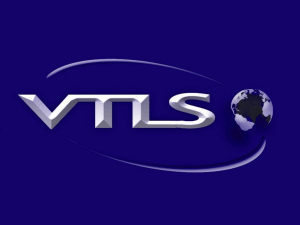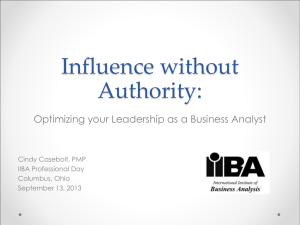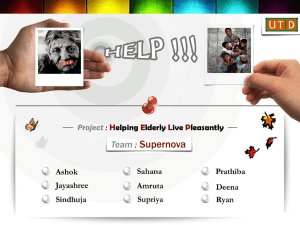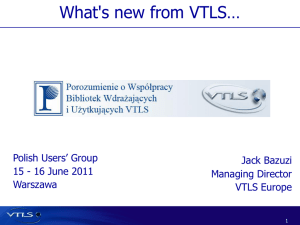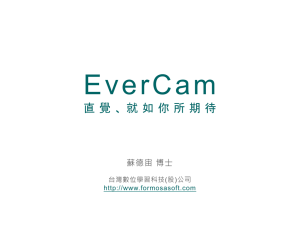Presentation
advertisement
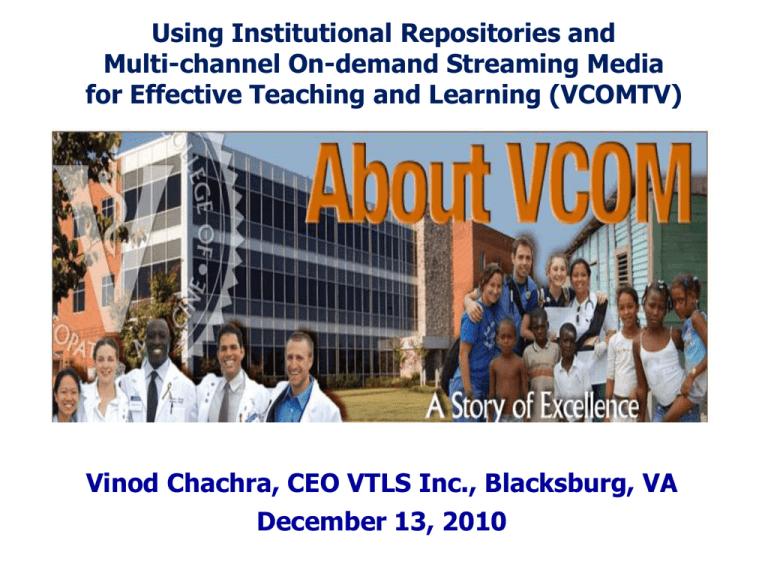
Using Institutional Repositories and Multi-channel On-demand Streaming Media for Effective Teaching and Learning (VCOMTV) Vinod Chachra, CEO VTLS Inc., Blacksburg, VA December 13, 2010 VTLS HQ in Blacksburg, VA, USA About VCOM and VTLS Partnership VTLS World Headquarters are located in Blacksburg, VA in a beautiful 32,500 square foot facility located at the Corporate Research Center (CRC) at Virginia Tech. VTLS was the first tenant at CRC VTLS employs 80 FTE in Blacksburg; VCOM (The Edward Via College of Osteopathic Medicine) and VTLS launched a program called VCOMTV. The program has been extremely successful. This presentation describes the different aspects of the program. 120 FTE worldwide. VTLS is celebrating its 25th Year This project (VCOMTV) is a joint partnership project of VCOM and VTLS About VCOM The Edward Via College of Osteopathic Medicine in Blacksburg, Virginia is a four-year osteopathic medical school offering the degree of Doctor of Osteopathic Medicine (D.O.). The MISSION of the Edward Via College of Osteopathic Medicine (VCOM) is to prepare globally minded, community-focused physicians for the rural and medically underserved areas of Virginia, North Carolina, South Carolina and the Appalachian Region, and to improve human health especially of those most in need. About VTLS Inc. VTLS is the first spin-off corporation from Virginia Tech. VTLS is an international company doing business in more than 40 countries. VTLS has offices/wholly owned subsidiaries in 7 countries. VTLS has four major products Virtua: Integrated Library System VITAL: Institutional Repository Software (used in VCOMTV) Visualizer: Discovery tool for distributed content (Now Chivas) VTRAX: RFID based tracking & security systems for libraries Necessity is the Mother of Invention VCOM medical students were frequently on rotation to hospitals and many were unable to be on campus and attend the lectures VCOM needed a way to reach these students without incurring tremendous costs in time and money. What started out as a method for reaching students on rotation has now turned into a very effective teaching tool for faculty and learning tool for all students, even those not on hospital rotations. The program is called VCOM-TV. The VCOMTV Solution VCOM met this particular requirement by recording classroom lectures in rich media format (dual stream video) synchronizing the lectures with presentation slides, producing streaming video of the synchronized content, and making these videos searchable and available on-demand via the web. VTLS provided the technology and service. Presentation Outline This presentation will discuss VCOMTV 1. Birth of VCOM-TV 2. Content Creation (self service focus) 3. Content Management Using Fedora and VITAL 4. Content Delivery Using Cloud Computing The entire process has three simple objectives: 1. Promote self-service 2. Control costs, and 3. Increase levels of service Will add fourth objective – quality management. The Birth of VCOMTV The program started one year ago The Via College of Osteopathic Medicine (VCOM) in Blacksburg, Virginia, embarked on a program (now called VCOM-TV) to create an effective teaching and learning environment for their students. Within the year the content increased tenfold and usage increased 800-fold. More than 1,000 different lectures are now available. An example of VCOMTV recording Play-stop-volume Controls Navigation Controls The Creation Process The creation process uses a multi-channel, video recording system. Whereas the system supports more than two channels – only two are used. One channel shows the faculty member and the other shows a PowerPoint (or any other activity – like lab experiments). These channels are automatically synchronized, which allows students to "jump" around in the content from either channel as needed. It lets students navigate and review small portions of a lecture (for exam preparation) from anywhere using a standard browser. The Creation Process In addition to being a consistent teaching tool, the system is an effective learning tool. It lets students navigate and review small portions of a lecture (for exam preparation) from anywhere using a standard browser. Except for the lecture preparation itself (which the faculty has to do anyway), the creation process is simple and, after the first time, can be handled by the faculty member without any outside help. An operator loads the data into the institutional repository. Creation Process – Recording Options There are three options available for recording: 1. Live in the class room 2. Pre-recorded in a studio (controlled environment) 3. Pre-recorded using portable studio This can be taken to a lab or an operation room The first two options can be self-service The third option requires operator assistance. VCOM does all its own recordings Creation Process - - Portable Studio Components: There is a setup in the back of the room 1. Back Drop 2. Light Source 3. First Channel: Camera 4. Second Channel: Laptop 5. Synchronizer & Recorder All this will be packaged on a single cart. Content Management The management Process is simple Once the recording is complete there is a possibility of editing the content. This step is optional. Created content is loaded into the VITAL repository and a metadata record created. This makes the content immediately available to the users. Only the content (not the metadata) is loaded to the cloud based streaming service provider. Google analytics are setup to monitor usage. The normal VITAL/Fedora backup-recovery-version control features are invoked. What does VITAL do? Provides Management Services Ingest – XML-encoded object submission Create – interactive object creation via API request Maintain – interactive object modification via API requests Validate – application of integrity rules to objects Identify – generate unique object identifiers Secure – authentication and access control Preserve – automatic content versioning and audit trail Export – XML-encoded object formats Provides tools to simplify the workflows Why VITAL? It manages the digital assets of the library It provides easy workflows for creating digital content It supports cloud computing and cloud based streaming It is based on open source and extensible infrastructure of Fedora It has a worldwide user base. VCOM was already using VITAL The VTLS VITAL Architecture using Fedora ACCESS PORTAL Administrative Tool Public Interface Object Management Reporting QuickEdit XML Access Control Vocabulary Lists Contribute Objects Object Displays Hi-Res Image Navigator Document Navigator RSS Feeds Citations Export (with QuikBib) Statistics SRU Web Crawlers Exposure Index Services SOLR/Lucene THUMBNAILS FULLTEXT JHOVE PREMIS HANDLES ASSIGNMENT METADATA SYNCHRONIZATION STATISTICS VTLS OAI Provider VITAL SERVICES LAYER Fedora VITAL Content Manager Ingest Batch Submission Tool Fedora OAI Provider Online submission tool VALET The Delivery Process The technology used to deliver the solution is not complex. Users access VCOMTV the repository Authenticate themselves Based on their authentication they are allowed to see certain collections Search the repository and select the desired content View and navigate content from a cloud-based streaming system using their standard browser. VCOMTV – VITAL & Cloud Based Streaming VTLS Cloud Cloud Streaming Streaming Services Services Streaming Requests Authentication and Search Requests Users For Example see VCOM-TV Result : Tremendous Growth The success of the program can be judged by the exceptional growth in the usage as shown below. In one year The number of videos has gone from 142 to 1,100 The bandwidth usage has grown from almost nothing to over 2,200 GB per month. The number of visitors has increased to more than 8,000 per month. Charts follow Result : Tremendous Growth (1 of 3) Visitors for VCOMTV 9000 8000 7000 6000 5000 4000 3000 2000 1000 0 Nov-09 Dec-09 Jan-10 Feb-10 Mar-10 Apr-10 May-10 Jun-10 Jul-10 Aug-10 Sep-10 Oct-10 Result : Tremendous Growth (2 of 3) VCOMTV Videos Online 1200 1000 800 600 400 200 0 Nov-09 Dec-09 Jan-10 Feb-10 Mar-10 Apr-10 May-10 Jun-10 Jul-10 Aug-10 Sep-10 Oct-10 Result : Tremendous Growth (3 of 3) VCOMTV GB Transferred 2500 2000 1500 1000 500 0 Nov-09 Dec-09 Jan-10 Feb-10 Mar-10 Apr-10 May-10 Jun-10 Jul-10 Aug-10 Sep-10 Oct-10 Questions to address (1) How do we measure the effectiveness of this delivery mechanism over traditional means? Do the students prefer this format to traditional means… For full lectures? For exam preparations? Is it better for students to take class notes (as an aid to concentration), or is it better for them to simply listen to the lecture knowing that they can review it later? Questions to address (2) Is it better to record the videos live in the classroom or prerecord them in the studio? Should the faculty members stop lecturing in the classrooms and instead require the students to listen to the lecture before they come to class and use the class time for discussions? When will these recorded lectures become obsolete? When should they be re-recorded? In short, what is the “life” of a typical recording? Questions to address (3) What other features are required to make the process simpler? What additional software features can make this system totally self-driven by faculty? How to change the program when the new campus opens in South Carolina next year? Other questions: Should we be recording dissertation defenses? If so, should we attach them to the ETDs? Can this system be used for lab work? Would this system be effective for safety training? Still other Questions? What other features are required to make the process simpler? What additional software features can make this system totally self-driven by faculty? How to change the program when the new campus opens in South Carolina next year? Other questions: Should we be recording dissertation defenses? If so, should we attach them to the ETDs? Can this system be used for lab work? Would this system be effective for safety training? Moving the Project Forward Create a dependable self recording environment for The classroom The recording studio Portable studio Instruct faculty on effective recording practices Prepare, prepare, prepare Stay within the camera view Control the recording process while lecturing Repeat the questions Package the portable studio Develop a pay-for-view option for non-students and professionals Record lectures that More than 3 years old Have questionable quality Are delivered offsite. Package solution so that others can use it -- VITAL Media Solution Summary - VTLS VITAL Media Solution The VTLS VITAL Media solution developed for this project is based on Fedora™ and VITAL. Fedora is an open source institutional repository. VITAL is an enhanced version of Fedora with a variety of workflows and system management capabilities. VCOM’s VITAL repository is used to store the content in small collections and provide discovery and authentication tools. When students log on, they are authenticated as first-year, secondyear, or third-year medical students and gain access to the appropriate sets of videos. The solution supports searching and discovery by means of topic, date, instructor, and many other user-defined facets. The videos are delivered on-demand using the VITAL Media Cloud option. Content can also be delivered using local streaming media resources. Thoughts - VTLS VITAL Media Solution At present Vital Media provides the turnkey solution (create, manage, deliver). Should it provide single aspects of the solution? Just the creation hardware / software Just VITAL for management if a campus already has its content. VITAL is a flexible digital content management tool and is already used several institutions Just hosted services for delivery of the content Thanks … Our success lies in making you successful Questions?
